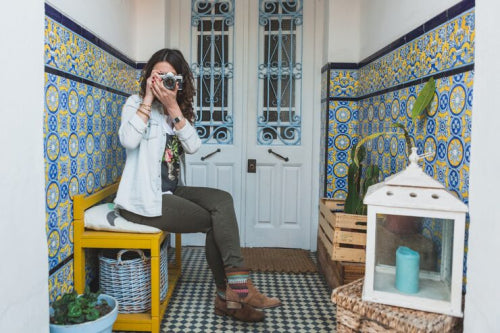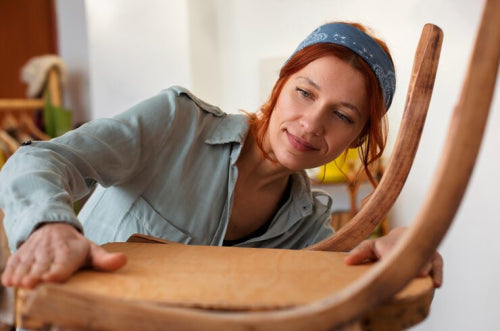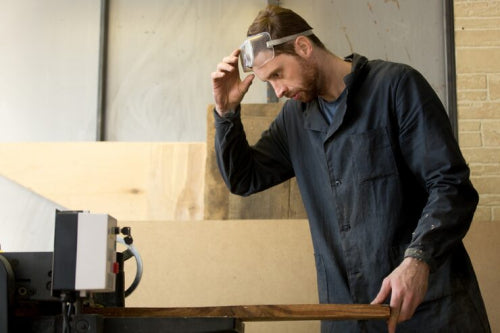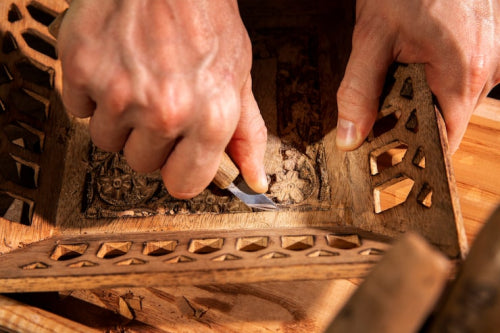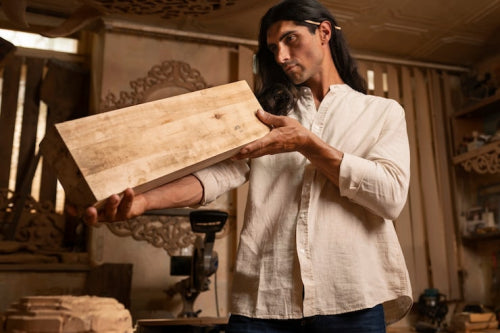Quick Listen:
In the sun-drenched embrace of Rajasthan's Aravalli hills, where turquoise lakes mirror the grandeur of forgotten palaces, Udaipur is quietly reshaping the contours of India's furniture design landscape. Once revered as the "City of Lakes" for its poetic beauty, this heritage haven is now a forge for innovation, where age-old carving techniques collide with forward-thinking aesthetics. Stroll through the labyrinthine lanes of Hathi Pol or peer into the workshops along Lake Pichola's edge, and you'll witness the alchemy: raw sheesham wood yielding to chisels that etch stories of royalty into sleek, contemporary forms. Udaipur's imprint on national and increasingly global furniture trends is undeniable, fueling a renaissance that prioritizes authenticity amid the clamor of industrialized output.
Mass-market furniture lacks heart, filling rooms with bland, short-lived pieces. Frequent breakdowns spark frustration, as replacements erode style and sentiment. At MMC Wood Creations, Udaipur artisans shape heirloom furniture with enduring craftsmanship and cozy elegance, creating pieces that echo your identity, ensuring your home radiates warmth and timeless connection. Shop Now!
A Legacy Etched in Wood
Udaipur's furniture heritage runs as deep as the roots of its banyan trees, a testament to centuries of artisanal mastery. Local craftspeople have long transformed abundant woods like teak and mango into indispensable household staples think the sturdy charpoy for lazy afternoons or the latticed jharokha screens that once veiled royal intrigues. These aren't mere utilities; they're cultural codices, encapsulating the ethos of a region where every motif whispers of monsoon rituals or desert resilience.
This rich tapestry finds scholarly validation in the Vernacular Furniture of North-West India initiative, an international collaborative research project spearheaded in December 2015 by the Design Innovation and Craft Resource Centre (DICRC) at CEPT University in Ahmedabad, India, alongside the South Asian Decorative Arts and Craft Collection (SADACC) Trust in Norwich, UK. Spanning Gujarat, Rajasthan, Punjab, and Haryana, the endeavor meticulously maps and studies everyday furniture born from local materials, shaped by skilled hands into forms that mirror the social and cultural rhythms of their locales. In a nation where vernacular expressions evolve every few hundred kilometers, these pieces from intimate home altars to communal benches in sacred spaces demand entry into guarded realms like private dwellings and temples, far trickier to access than grand facades. Such documentation underscores how Udaipur's designs, with their fluid curves and symbolic inlays, continue to anchor daily life, evolving yet unyielding.
Fast-forward to today, and this legacy pulses with renewed vigor. Artisans, many hailing from families with generations of chisel-wielding expertise, are resurrecting dormant skills: the delicate piercework of jaali screens or the luminous sheen of mother-of-pearl embeds. Yet they're not fossilized relics; these techniques now infuse modern necessities, yielding hybrids like a low-slung lounge chair whose brass-flecked legs evoke Mewar's warrior motifs while cradling the contours of a minimalist urban sofa. This evolution positions Udaipur as a bulwark against the soulless churn of factory lines, offering designs that command premium spaces in Delhi high-rises or New York lofts alike.
Trends Forging Tomorrow's Interiors
Udaipur's furniture vanguard is steering India's design discourse with trends that marry environmental stewardship to aesthetic daring. At the forefront: sustainability, no longer a niche plea but a core imperative. Workshops here champion reclaimed teak and certified mango wood, their non-toxic varnishes ensuring pieces that age gracefully without taxing the earth. This ethos resonates deeply in Rajasthan, where arid terrains make resource conservation a survival art, birthing collections that boast carbon footprints lighter than their imported rivals.
Personalization surges as another powerhouse, democratizing luxury in an era of fleeting fads. Gone are the days of off-the-rack uniformity; instead, clients co-author their legacies, commissioning headboards that replay Udaipur's frescoed palaces or ottomans stitched with block-printed tales from local folklore. MMC Wood Creations exemplifies this shift, their bespoke atelier in Sukher turning client sketches into heirlooms modular wardrobes that morph with family growth or dining ensembles etched with personal crests. Rooted in a 1967 legacy from Sujan Singh Chhabra & Co., MMC blends over five decades of Udaipur know-how with cutting-edge customization, their pieces a symphony of form and feeling.
The true dazzle, however, lies in fusion's alchemy. Classic elements vibrant lacquer reds from Rajput courts or geometric latticework born of defensive forts reemerge in softened guises: curved-edge consoles with fluted surfaces in moody walnut tones, or statement tables grained like sunset sands, their mandala borders hand-carved for tactile poetry. These aren't pastiches but profound dialogues, where a Mumbai pied-à-terre might host a screen divider channeling Udaipur's zenanas, or a London atelier display inlaid stools that nod to Aravalli wilds. Multi-functional marvels amplify this: sofas that unfold into guest beds, their frames hiding smart charging nooks, all while honoring Rajasthan's thrift-for-thriving spirit. In Udaipur's 2025 playbook, furniture isn't static it's a living narrative, adaptive and alive.
Tangible Ripples of Influence
Udaipur's design ethos isn't confined to sketchpads; it's rippling through economies and ecosystems with measurable force. Locally, the sector employs hundreds from raw wood sorters in village co-ops to digital-savvy marketers in city hubs infusing vitality into a post-pandemic recovery. MMC Wood Creations stands as a lodestar here, their Sukher facility a hive where 50-plus artisans forge everything from Nyx accent chairs to Jasper TV units, each iteration a bridge from heritage kilns to high-end showrooms. A bespoke dining table might demand three weeks: sourcing sustainable slabs, carving motifs under master guidance, then burnishing to a mirror sheen that captures lake-light play.
Globally, collaborations proliferate like monsoon vines. Udaipur workshops now supply European boutiques with brass-inlaid consoles or American firms with peacock-feather inspired loungers, their authenticity a salve against synthetic sameness. The House of Things, a Udaipur outpost blending art and craft, exemplifies this crossover, curating collections that fuse local jaali with international minimalism. Such ventures not only elevate Rajasthan's GDP furniture exports from the state surged 15% in 2024 but also repatriate prestige, drawing young talent back to ancestral lathes.
Case in point: Shiv Furniture's modular kitchens, where Udaipur's innate functionality meets IoT smarts, transforming compact urban flats into seamless sanctuaries. These aren't isolated triumphs; they're harbingers of a sector where Udaipur's hand-hewn heart beats in silicon-valley smart homes.
Navigating the Thorny Path
For all its luster, Udaipur's ascent harbors shadows. The paramount tension: authenticity versus volume. Each hand-carved panel devours days, yet surging orders from metro elites pressure workshops to accelerate, risking the soul-sapping shortcuts of mechanization. Online behemoths, peddling sub-$100 knockoffs, erode margins, their glossy feeds masking the void of narrative.
Supply chains snag too fluctuating teak tariffs and climate-stressed forests complicate consistent sourcing, even as artisans vow eco-fidelity. Quality's a labyrinth in bespoke realms, where one warped inlay can tarnish a reputation built on decades. Looming largest: succession's fragility. With master carvers averaging 60 years, imparting arcane flourishes to millennials hooked on algorithms demands deliberate bridges apprenticeships laced with digital lore to sustain the flame.
Yet these aren't impasses but invitations to ingenuity, much like the adaptive lattices that cooled Udaipur's havelis through scorching summers.
Horizons of Promise
Challenges notwithstanding, Udaipur's vista brims with bounty. India's swelling urban bourgeoisie projected to hit 600 million by 2030 craves provenance-laden pieces, a niche where local motifs trump generic gleam. Sustainability sells itself: MMC's reclaimed lines, for instance, slash embodied carbon by 40%, wooing eco-literate buyers who'll pay premiums for planetary kinship.
International allure beckons bolder. Paris ateliers now commission Udaipur chaises with sunset-hued grains, their dramatic veining a nod to Rajasthan's dunes. Cross-pollinations flourish artisans partnering with Milanese minimalists for velvet-upholstered thrones or Silicon Valley for wellness-integrated benches that pulse with biometric calm. In this matrix, Udaipur isn't peripheral; it's pivotal, its crafts a currency in global design's bazaar.
Efficiencies accrue too: modular blueprints cut waste by 25%, while VR previews slash revision cycles, empowering MMC et al. to scale sans dilution. The payoff? A virtuous cycle where artisan wages rise, communities thrive, and Udaipur's imprimatur graces boardrooms from Bandra to Brooklyn.
Crafting an Enduring Tomorrow
Udaipur's ascendance as India's furniture fulcrum transcends ephemera it's a paean to resilience, where chisel meets code in harmonious defiance of disposability. As artisans weave tradition's threads into innovation's loom, they don't merely furnish rooms; they furnish futures, narratives that soothe a world adrift in artifice. Experts forecast a stellar trajectory: by 2030, Rajasthan's design exports could double, with Udaipur as epicenter, buoyed by policies nurturing craft clusters.
For trailblazers like MMC Wood Creations, the mandate is clear: honor the chisel's whisper while courting the cloud's reach hybrid apprenticeships, blockchain-traced sourcing, immersive client realms. In this blueprint, Udaipur doesn't chase trends; it authors them.
So, the next time your fingers trace a table's undulant grain or your gaze lingers on brass's burnished gleam, pause. That subtle story? It likely hails from Udaipur's sun-kissed studios a city where wood remembers, hearts endure, and hope is hand-hewn, one stroke at a time.
Frequently Asked Questions
What makes Udaipur furniture design unique compared to other Indian furniture styles?
Udaipur furniture design stands out for its fusion of traditional Rajasthani craftsmanship with contemporary aesthetics. Local artisans use heritage techniques like delicate jaali (lattice) screens, mother-of-pearl inlays, and intricate carving motifs that reflect Mewar's royal legacy, while adapting these elements into modern functional pieces. The city's furniture combines sustainable materials like reclaimed teak and mango wood with personalized customization, creating pieces that tell stories through hand-carved details and brass-flecked accents.
How is Udaipur contributing to sustainable furniture trends in 2025?
Udaipur is leading India's sustainable furniture movement by championing reclaimed teak and certified mango wood with non-toxic varnishes that age gracefully without environmental impact. Local workshops have reduced embodied carbon by 40% through their reclaimed wood lines, while modular designs cut waste by 25%. This eco-conscious approach resonates deeply in Rajasthan's arid landscape, where resource conservation is essential, making Udaipur furniture both environmentally responsible and culturally authentic.
What challenges does Udaipur's furniture industry face while scaling globally?
Udaipur's furniture industry faces the critical challenge of maintaining authenticity while meeting increasing global demand, as hand-carved pieces require days to complete but orders surge from metropolitan buyers. Supply chain issues include fluctuating teak tariffs and climate-stressed forests, making consistent sourcing difficult. The industry also grapples with succession concerns as master carvers average 60 years of age, requiring innovative apprenticeship programs that blend traditional skills with digital knowledge to preserve ancient techniques for future generations.
Disclaimer: The above helpful resources content contains personal opinions and experiences. The information provided is for general knowledge and does not constitute professional advice.
You may also be interested in: Outdoor Furniture
Mass-market furniture lacks heart, filling rooms with bland, short-lived pieces. Frequent breakdowns spark frustration, as replacements erode style and sentiment. At MMC Wood Creations, Udaipur artisans shape heirloom furniture with enduring craftsmanship and cozy elegance, creating pieces that echo your identity, ensuring your home radiates warmth and timeless connection. Shop Now!
Powered by flareAI.co
